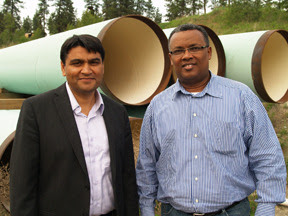UBC researchers have developed a tool that is designed to help small to medium-sized cities and towns address the challenges posed by aging drinking water infrastructure in Canada.
The tool, developed by Solomon Tesfamariam and Rehan Sadiq, both civil engineering professors at the University of British Columbia’s Okanagan campus, helps municipal water system operators and managers better understand the state of their infrastructure.
Tesfamariam explained that, “While larger cities like Vancouver or Toronto have access to budgets, engineers, and sophisticated data collection systems, smaller centres often have a single person who is responsible for looking after the entire drinking water system.”
“Through our continued interaction and engagement on a variety of projects, we have been able to identify the challenges faced by municipalities […] These challenges include limited technical expertise, lack of readily useable data, and insufficient financial resources,” said Sadiq.

The tool is designed for smaller jurisdictions to assess and understand their water systems and compare them with like-sized cities and towns. It helps water managers understand what data is needed, how to develop inventories of the various elements of a drinking water supply system including infrastructure related to source water, treatment and water distribution), and how to use an asset management framework for decision-making. It combines performance assessment, deterioration modelling, life-cycle costing, and financial reporting guidelines for water systems.
Currently, the researchers are working with small municipalities in British Columbia to use the tool. They have plans to create consortium of small cities and towns across the province and create a performance assessment system similar to the National Water and Wastewater Benchmarking initiative, which mainly sees participation by larger cities.
“We are interested in working with a variety of municipalities who come to us and express need and to have them work together as a consortium or group of consortiums. Our vision is that they are able to share data, pool resources, establish common benchmarks, and be able to transfer training and knowledge opportunities among one another,” said Sadiq.
“As we move forward, it’s envisioned that we can benchmark for different climate and geographic conditions, create source to tap performance assessment and management, and use GPS enabled performance assessment apps,” said Tesfamariam.










